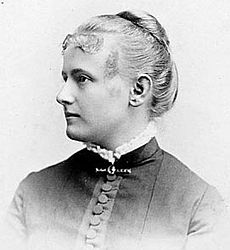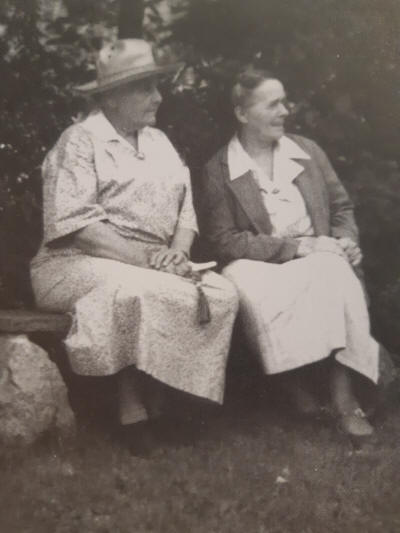

Partner Clara French and Florence Converse, buried together with Converse
Queer Places:
Smith College (Seven Sisters), 9 Elm St, Northampton, MA 01063
University of Oxford, Oxford, Oxfordshire OX1 3PA
250 Newbury St, Boston, MA 02116
Wellesley College (Seven Sisters), 106 Central St, Wellesley, MA 02481
45 Leighton Rd, Wellesley, MA 02482, USA
Philbrook Farm Inn, 881 North Rd, Shelburne, NH 03581
95 Rivington St, New York, NY 10002
Denison House, 93 Tyler St, Boston, MA 02111
Newton Cemetery, 791 Walnut St, Newton Centre, MA 02459, Stati Uniti
 Julia
Vida Dutton Scudder (December 15, 1861 – October 9, 1954) was an American
educator, writer, and welfare activist in the social gospel movement. Vida Dutton Scudder
lived for 35 years with the writer
Florence Converse, her
‘comrade and companion’. They taught and did Settlement work together, and
wrote fiction drawing on their relationship. Their friends
Katharine Coman and
Katharine Lee Bates,
professors of economics and sociology, and English, respectively,
co-founders of the Rivington Street Settlement, and partners for a quarter
of a century, left Bates’ celebrated and loving poetic memoriam of Coman’s
illness and death from breast cancer, the earliest such record in American
literature.
Julia
Vida Dutton Scudder (December 15, 1861 – October 9, 1954) was an American
educator, writer, and welfare activist in the social gospel movement. Vida Dutton Scudder
lived for 35 years with the writer
Florence Converse, her
‘comrade and companion’. They taught and did Settlement work together, and
wrote fiction drawing on their relationship. Their friends
Katharine Coman and
Katharine Lee Bates,
professors of economics and sociology, and English, respectively,
co-founders of the Rivington Street Settlement, and partners for a quarter
of a century, left Bates’ celebrated and loving poetic memoriam of Coman’s
illness and death from breast cancer, the earliest such record in American
literature.
She was born in Madurai, India, in 1861, the only child of David Coit Scudder (of the Scudder family of missionaries in India) and Harriet Louise (Dutton) Scudder. After her father, a Congregationalist missionary, was accidentally drowned in 1862, she and her mother returned to the family home in Boston. Apart from travel in Europe, she attended private secondary schools in Boston, and was graduated from the Boston Girl's Latin School in 1880. Scudder then entered Smith College, where she received her BA degree in 1884.[1]
In 1885 she and Clara French were the first American women admitted to the graduate program at Oxford, where she was influenced by York Powell and John Ruskin. While in England she was also influenced by Leo Tolstoi and by George Bernard Shaw and Fabian Socialism. Scudder and French returned to Boston in 1886.[1][2]

Scudder and Converse
The American English literature specialist Vida Scudder had met the Barnetts in England, and she’d heard about Toynbee Hall. She was excited by the potentially revolutionary programme of undertaking social reform by living among the poor. It happened like this: she was walking and talking at a reunion with her Smith College friends in meadows by the wide Connecticut river in the autumn sunshine of 1887 when, ‘Suddenly, a Thought flew among us, like a bird coming out of the air; flashing above and around, seen, vanished: Why could not we young women start something of the same kind in our own country?’ It took them two years, held back by the lack of funds and by parental opposition, but they – the prime movers were Scudder and two other university women friends, Katharine Lee Bates and Katharine Coman – managed to open the first women’s Settlement in the United States at 95 Rivington Street on New York’s Lower East Side in September 1889. Scudder’s Settlement was in an old, run-down aristocratic mansion at the centre of a highly congested tenement-house district. When the College Settlement, as it was named, first opened its silver-hinged mahogany doors, there were seven residents, representing three women’s colleges. They painted floors and sewed carpets, washed windows and shovelled snow. Their first visitor was the local policeman, perplexed by the presence of such women in the midst of the slums, and suspecting it to be a house for ladies of a different kind. Many women were attracted to the idea of thus living in the slums: there were 80 applications for residency in the first year. The College Settlement’s first offering to the neighbourhood was a facility for bathing at five cents a time in gas-lighted bathrooms. Following huge demand, this activity was soon taken over by other charitable organizations. In 1911, 95 Rivington Street boasted multiple clubs and classes, a library, a savings bank, a kindergarten, music and cooking schools, medical aid, and work in connection with the courts, schools, churches and other philanthropic organizations. Social science classes had been started in 1894 to generate social awareness among residents and the community about subjects such as tenement housing, public schools and the history of factory legislation; social reform was a key Settlement aim.
Scudder taught English literature from 1887 at Wellesley College, where she became an associate professor in 1892 and full professor in 1910.[2][3]
She was one of the founders, in 1887, of the College Settlements Association, along with Helena Dudley, Katharine Coman, Katharine Lee Bates, and other women.[4] When Vida Dutton Scudder, Katharine Lee Bates, and Katharine Coman came up with the idea of a settlement house, Coman turned to her friend, Cornelia Warren, for funding to get it up and running. She and Emily Greene Balch were also involved with the establishment of the CSA's third settlement house venture, Denison House in Boston.[5] Scudder was its primary administrator from 1893 to 1913.[1]
When French died in 1888, Scudder joined the Society of the Companions of the Holy Cross, a group of Episcopalian women dedicated to intercessionary prayer and social reconciliation. Also in 1888, she joined the Society of Christian Socialists, which, under the Rev. William Dwight Porter Bliss, established the Church of the Carpenter in Boston and published The Dawn.[1][2]
In 1893 Scudder was a delegate to the convention of the Boston Central Labor Union.[3] Later, she helped organize the Federal Labor Union, a group of professional people who associated themselves with the American Federation of Labor.[1]
Having received a leave of absence from Wellesley for 1894–96, Scudder spent a year in Italy and France studying modern Italian and French literature.[2]
In 1903 Scudder helped organize the Women's Trade Union League. The same year she became director of the Circolo Italo-Americano at Denison House.[1]
Upon hearing of Abby Adeline Manning's death in 1906, scores wrote to Anne Whitney to express their condolences. Vida Scudder wrote Whitney from Europe, "in one sense, you will not be lonely, for, as you say, her life is yours."
Moving farther to the left, in 1911 Scudder co-founded the Episcopal Church Socialist League and joined the Socialist Party. Scudder attempted to reconcile the conflicting doctrines of Marxism and Christianity. She became controversial in 1912 when she supported striking textile workers in Lawrence, Massachusetts, and spoke at a strike meeting, but Wellesley resisted calls for her dismissal as a professor.[3] In Scudder's famous speech, she declared,
I would rather never again wear a thread of woolen than know my garments had been woven at the cost of such misery as I have seen and known past the shadow of a doubt to have existed in this town....If the wages are of necessity below the standard to maintain man and woman in decency and in health, then the woolen industry has not a present right to exist in Massachusetts.[6][7]
In 1913 Scudder ended her association with Denison House and moved to Wellesley, Massachusetts, with her elderly mother, who died in 1920.[1]
Unlike Eugene Victor Debs and other Socialist leaders, Scudder supported President Woodrow Wilson's decision to intervene in the First World War in 1917. In 1919 she founded the Church League for Industrial Democracy.
From 1919 until her death, Scudder lived with Florence Converse[8] In Wellesley they resided at 45 Leighton Road.[9] She lived with Helena Dudley, her closest friend, from 1922 until Dudley's death in 1932.[10][11]
At Wellesley College the poet Katherine Lee Bates developed an intimate partnership with fellow poet Katharine Coman, the professor of economics and dean of the college. They jointly wrote English History as Taught by English Poets.[12] Their “Boston Marriage” of living together for twenty-five years ended in Coman’s cancer death at age 57. Bates, in her agony, published Yellow Clover: A Book of Remembrance[13] celebrating their love, common labor in education and literature and their involvement in social reform with their colleague Vida Scudder.[14]
In the 1920s Scudder embraced pacifism. She joined the Fellowship of Reconciliation in 1923, the same year she gave a series of lectures before the Women's International League for Peace and Freedom in Prague.
Scudder had received the degree of LHD from Smith College in 1922. From Nashotah House, an Episcopal seminary in Nashotah, Wisconsin, she received an LLD degree in 1942.[9]
Scudder retired from Wellesley in 1927 and received the title of professor emeritus.[3][9] She became the first dean of the Summer School of Christian Ethics in 1930 at Wellesley. In 1931 she lectured weekly at the New School for Social Research in New York.
During the last decade of her life, Helena Dudley lived with her close friend Vida Dutton Scudder in Wellesley, Massachusetts. In 1932, she and Scudder attended the seventh congress of the Women's International League in Grenoble, France. Shortly afterwards, while visiting friends in Geneva, Switzerland, Dudley was taken ill and died at the age of 74.[14]
Scudder published an autobiography, On Journey, in London in 1937, and a collection of essays, The Privilege of Age, in New York in 1939.
Vida Dutton Scudder died at Wellesley, Massachusetts, on October 10, 1954, and is buried alongside Florence Converse at Newton Cemetery, Newton, Massachusetts.[15]
Scudder is honored with a feast day on the liturgical calendar of the Episcopal Church (USA) on October 10.
My published books: